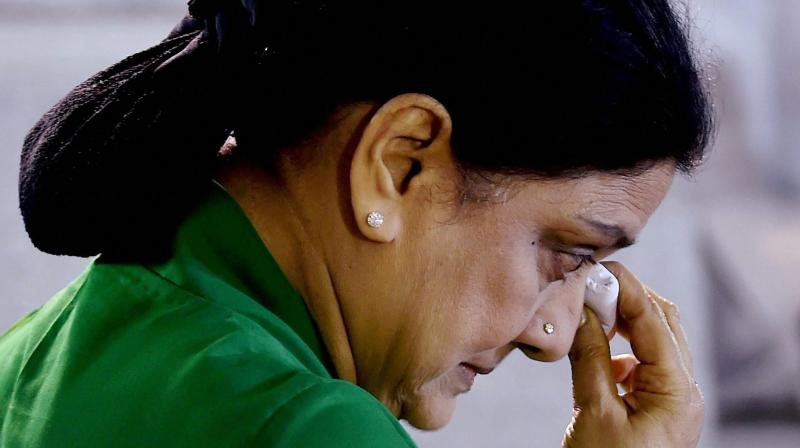Corruption is insatiable vice for wealth': SC convicts Sasikala in DA case
Justice Amitava Roy said the maze of 34 companies, most of them shell firms, were created to deceive process of law.

New Delhi: Corruption is an "insatiable vice" for wealth which gave unfair advantage to the dishonest, leading to escalation of the divide between the haves and the have-nots, the Supreme Court said today.
Pulling the curtains down on the sensational 19-year-old assets case involving late J Jayalithaa and her close aide Sasikala, Justice Amitava Roy said the maze of 34 companies, most of them shell firms, were created to deceive process of law and justify the unaccounted wealth, showing a deep-rooted conspiracy for amassing vast assets.
Justice Roy, who wrote a separate but concurring verdict in the case, dealt with the growing menace of corruption in public life and said it emanated from "moral debasement" of people and "gave unfair advantage to the dishonest, leading to escalation of the divide between the haves and have nots".
Corruption is the "insatiable vice" for wealth and "unscrupulous" elements take unfair advantage of their power and authority in public office and breach institutional norms.
"The attendant facts and circumstances encountered, demonstrate a deep-rooted conspiratorial design to amass vast assets without any compunction and hold the same through shell entities to cover up the sinister trail of such illicit acquisitions and deceive and delude process of law. Novelty in the outrages and the magnitude of the nefarious gains as demonstrated by the revelations in the case are startling.
"A growing impression in contemporary existence seems to acknowledge the all pervading pestilent presence of corruption almost in every walk of life, as if to rest reconciled to the octopoid stranglehold of this malaise with helpless awe. The common day experiences indeed do introduce one with unfailing regularity, the variegated cancerous concoctions of corruption with fearless impunity gnawing into the frame and fabric of nation's essentia," Justice Roy said.
"Corruption is a vice of insatiable avarice for self aggrandizement by the unscrupulous, taking unfair advantage of their power and authority and those in public office also, in breach of the institutional norms, mostly backed by minatory loyalists. Both the corrupt and the corrupter are indictable and answerable to the society and the country as a whole.”
"This is more particularly in the peoples' representatives in public life committed by the oath of the office to dedicate oneself to the unqualified welfare of the laity, by faithfully and conscientiously discharging their duties attached thereto in accordance with the Constitution, free from fear or favour or affection or ill-will," Justice Roy said.
Justice Roy said "self-serving" conduct by peoples' representatives in defiance of the undertaking to work for the society was "infringement of community's confidence shown in them and a betrayal of the promise of allegiance to the Constitution."
"Not only such a character is an anathema to the preambulor promise of justice, liberty, equality, fraternal dignity, unity and integrity of the country, which expectantly ought to animate the life and spirit of every citizen of this country, but also is an unpardonable onslaught on the constitutional religion that forms the bedrock of our democratic polity," the judgement said.
Corruption which emanates from "moral debasement" gives unfair advantage to the dishonest, it said.
"This pernicious menace stemming from moral debasement of the culpables, apart from destroying the sinews of the nation's structural and moral set-up, forges an unfair advantage of the dishonest over the principled, widening as well the divide between the haves and have nots.”
"Not only this has a demoralising bearing on those who are ethical, honest, upright and enterprising, it is visibly anti-thetical to the quintessential spirit of the fundamental duty of every citizen to strive towards excellence in all spheres of individual and collective activity to raise the nation to higher levels of endeavour and achievement."
Stressing that such a situation triggered an imbalance in the society's existential stratas and stalled constructive progress in the overall well-being of the nation, the court said such act disrupts dynamics of fiscal governance and encourages defiance of law.
"Such is the militant dominance of this sprawling evil, that majority of the sensible, rational and discreet constituents of the society imbued with moral values and groomed with disciplinal ethos find themselves in minority, besides estranged and resigned by practical compulsions and are left dejected and disillusioned. A collective, committed and courageous turnaround is thus the present day imperative to free the civil order from the suffocative throttle of this deadly affliction," the bench said.
The court said that in order to remove corruption from the society, "every citizen has to be a partner in this sacrosanct mission, if we aspire for a stable, just and ideal social order as envisioned by our forefathers and fondly cherished by the numerous self-effacing crusaders of a free and independent Bharat, pledging their countless sacrifices and selfless commitments for such cause."

